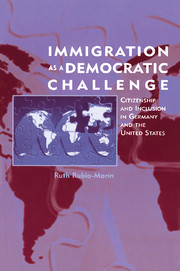Book contents
- Frontmatter
- Contents
- Acknowledgements
- 1 Introduction
- 2 A democratic challenge
- 3 Fair to whom?
- 4 Safeguarding liberal democracy from itself
- 5 Inclusion without consent
- 6 Keeping nationality relevant
- 7 The constitutional debate in the United States
- 8 The constitutional debate in Germany
- 9 Summary and final remarks
- Bibliography
- Index
- Index of Cases
9 - Summary and final remarks
Published online by Cambridge University Press: 22 September 2009
- Frontmatter
- Contents
- Acknowledgements
- 1 Introduction
- 2 A democratic challenge
- 3 Fair to whom?
- 4 Safeguarding liberal democracy from itself
- 5 Inclusion without consent
- 6 Keeping nationality relevant
- 7 The constitutional debate in the United States
- 8 The constitutional debate in Germany
- 9 Summary and final remarks
- Bibliography
- Index
- Index of Cases
Summary
Postwar processes of economic globalization have been a major stimulus to human and labour mobility across frontiers. Restrictive naturalization practices and territorially exclusive definitions of national citizenship centred around the idea of common descent, as well as a persistent resistance to disentangling the full enjoyment of rights and freedoms from nationality, as a membership status, have generated a split in those countries which are most affected by immigration between what one could call their societal and their political communities. Throughout this book, I have criticized this split as posing serious democratic legitimacy concerns which make us wonder whether nationality will become a privileged status of the modern world, dividing the ordinary population of the state into first- and second-class citizens and allowing only the former into the realm which defines the boundaries of democratic membership. There are reasons to believe that this concern will be with us for some time in the future.
As a matter of fact, there have already been some reactions to the new order of things. Thus, some Western countries have granted permanent resident immigrants almost all of the rights citizens enjoy, including civil and economic freedoms, social rights, a rather secure residential status and, occasionally, a comprehensive status of political rights, such as the right to vote in local elections. However, at the same time, there are still movements which call into question the apparent stability of the situation reached, like the current curtailment of social benefits to permanent resident aliens in the USA.
Information
- Type
- Chapter
- Information
- Immigration as a Democratic ChallengeCitizenship and Inclusion in Germany and the United States, pp. 235 - 250Publisher: Cambridge University PressPrint publication year: 2000
